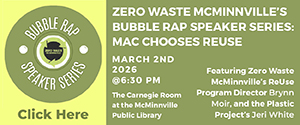Reusable bags safe, but wash often, Ag Dept says
Some shoppers and stores are starting to raise concerns about reusable bags in the time of the coronavirus.
According to the Oregon Department of Agriculture, the bags are safe to use — but shoppers should wash them after every use, and stores should discourage shoppers from placing them on checkout stand conveyor belts, or disinfect the belts often.
In addition, it says stores should encourage customers to pack their own groceries if they are using their own bags, a popular practice since the state banned single-use plastic bags.
“Currently there is no evidence of food or food packaging being associated with the transmission of the coronavirus,” according to the federal Food & Drug Administration.
The Agriculture Department offers the following advice for shoppers:
“Shopping bags should be washed after every use when carrying food just as you would launder a kitchen towel. Canvas or cloth bags can be laundered in the washer following manufacturer instructions. The inside of plastic-lined bags should be scrubbed using hot water and soap. For all types of grocery shopping bags, remove any inserts (many are cardboard), turn each bag inside out before washing, and pay special attention to the nooks and crannies around the seams. Clean any inserts with a disinfecting spray cleaner and follow the disinfectant label instructions.”
Additional cleaning advice is online at oda.fyi/CleanReusableBags, a site created by the American Cleaning Institute. It also recommends separate, labeled bags for raw meat and seafood, and produce, and for non-food items such as books or sports gear, and advises against storing bags in the trunk of the car.
Coronavirus is thought to spread mainly from person-to-person, especially between people in close contact with one another (within about 6 feet), and through respiratory droplets produced when an infected person coughs or sneezes.
It may be possible for a person to contract COVID-19 by touching a surface or object that has the virus on it and then touching their mouth, nose, or possibly eyes, but the FDA said it’s not “the main way the virus spreads at this time.”
The FDA recommends people follow typical food safety practices, including washing hands before eating or preparing food.












Comments